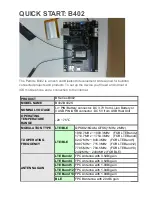Crossbar Switch (XBAR)
MPC5565 Microcontroller Reference Manual, Rev. 1.0
7-10
Freescale Semiconductor
The only other time the XBAR has control of the slave port is when no masters are making access requests
to the slave port and the XBAR is forced to either park the slave port on a specific master, or place the
slave port into low-power park mode. In these cases, the XBAR forces IDLE for the transfer type.
7.3.5
Priority Assignment
Each master port must be assigned a unique 2-bit priority level in fixed priority mode. If multiple master
ports are assigned the same priority level within a register (XBAR_MPR) undefined behavior results.
7.3.6
Arbitration
XBAR supports two arbitration schemes; a simple fixed-priority comparison algorithm, and a round-robin
fairness algorithm. The arbitration scheme is independently programmable for each slave port.
7.3.6.1
Fixed Priority Operation
When operating in fixed-priority arbitration mode, each master is assigned a unique priority level in the
XBAR_MPR. If two masters both request access to a slave port, the master with the highest priority in the
selected priority register gains control over the slave port.
Any time a master makes a request to a slave port, the slave port checks to see if the new requesting
master’s priority level is higher than that of the master that currently has control over the slave port (if any).
The slave port does an arbitration check at every clock edge to ensure that the proper master (if any) has
control of the slave port.
If the new requesting master’s priority level is higher than that of the master that currently has control of
the slave port, the higher priority master is granted control at the termination of any currently pending
access, assuming the pending transfer is not part of a burst transfer.
A new requesting master must wait until the end of the fixed-length burst transfer, before it is granted
control of the slave port. But if the new requesting master’s priority level is lower than that of the master
that currently has control of the slave port, the new requesting master is forced to wait until the master that
currently has control of the slave port is finished accessing the current slave port.
7.3.6.2
Round-Robin Priority Operation
When operating in round-robin mode, each master is assigned a relative priority based on the master port
number. This relative priority is compared to the port number of the last master to perform a transfer on
the slave bus. The highest priority requesting master becomes the owner of the slave bus at the next transfer
boundary (accounting for fixed-length burst transfers). Priority is based on how far ahead the port number
of the requesting master is to the port number of the last master.
After granted access to a slave port, a master may perform as many transfers as desired to that port until
another master makes a request to the same slave port. The next master in line is granted access to the slave
port when the current transfer is completed, or possibly on the next clock cycle if the current master has
no pending access request.
Summary of Contents for MPC5565
Page 18: ...MPC5565 Microcontroller Reference Manual Devices Supported MPC5565 MPC5565 RM Rev 1 0 09 2007...
Page 34: ...MPC5565 Reference Manual Rev 1 0 Freescale Semiconductor 15...
Page 35: ...MPC5565 Reference Manual Rev 1 0 16 Freescale Semiconductor...
Page 553: ...Flash Memory MPC5565 Microcontroller Reference Manual Rev 1 0 13 38 Freescale Semiconductor...
Page 559: ...SRAM MPC5565 Microcontroller Reference Manual Rev 1 0 14 6 Freescale Semiconductor...
Page 973: ...Preface MPC5565 Microcontroller Reference Manual Rev 1 0 21 36 Freescale Semiconductor...
Page 1153: ...Calibration MPC5565 Microcontroller Reference Manual Rev 1 0 B 8 Freescale Semiconductor...


















